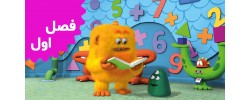
Language is a medium through which ideas are expressed and through which communication between people is formed. Learning English plays an important role in the process of learning the size of languages and other things as well. In this regard, the effect of bilingualism on students' math learning is important. Teaching a second language helps students to increase their understanding of the material. Mathematics as one of the main subjects of students is important for progress and success. It also serves as a major tool to improve students' logic. Thinking and cognitive skills in other scientific fields such as physics, statistics and engineering depend on mathematics. Therefore, mathematical skills are a necessary condition for understanding other subjects.
One of the most important critical components of learning mathematics is solving conceptual problems. In fact, the understanding of mathematics is primarily dependent on the concept of the word. Therefore, the influence of bilingualism on math learning cannot be ignored.
Most students who only speak their mother tongue have a harder time learning math. Because their language is different from mathematical language. But bilingual children who are familiar with English learn it more easily by understanding math words
According to research, success in mathematics depends partly on verbal skills. In multilingual educational environments, learning English helps students improve mathematics.
Proficiency in mathematics is not just a calculation skill but
also depends to some extent on word comprehension abilities. Research shows that
performance in mathematics depends on English proficiency. Usually, the content
of the mathematics curriculum is often transmitted orally from the teacher to
the students. While the teaching and evaluation of this curriculum is done
through books and written evaluation, therefore, insufficient mastery of
English in mathematics education will inevitably lead to problems in solving
mathematical problems. However, the relationship between language and math
abilities has become a concern in multicultural and multilingual educational
environments that aim to educate a large number of students with immigrant
backgrounds and different languages with different fluency. According to the
aforementioned relationship between language and math achievement, students who
speak their mother tongue have less mastery in math learning. In order to better understand the topic, it is suggested that you read the article related to the Interesting cartoon and math training Number blocks article.
Language problems in immigrants and its negative impact on their math learning progress have been reported in many countries. For example, the mathematics performance of South African students was low compared to other countries in the third international study of mathematics and science. Interestingly, all math assessments were completed in English, which was the second or third language for more than 70 percent of students. In addition, they showed that students' mastery of English makes them successful in mathematics.
The purpose of these studies was to further investigate the relationship between the mother tongue of different student populations, their performance in reading comprehension of the school's language of instruction, and their relative achievement in mathematics. In a society where there are international schools, with the spread of the issue of the relationship between English and mathematics, understanding words is important in solving problems, so acquiring language skills is a priority in education.
Skill means the ability resulting from knowledge, practice,
talent, etc. to perform a specific activity, or in other words, the ability to
perform well in the task that is presented to them. Language skills include:
listening, speaking, reading and writing.
How bilingualism affects math learning in students
Children who grow up bilingual may be more creative. Bilingualism may prevent learning disabilities. and that bilinguals perform better in tasks that involve multi directional attention between different objects. This led some researchers to realize that speaking two languages may improve brain functions. So that the student can develop his skills in performing activities in the best way.
References
sciencedirect







Leave a Comment